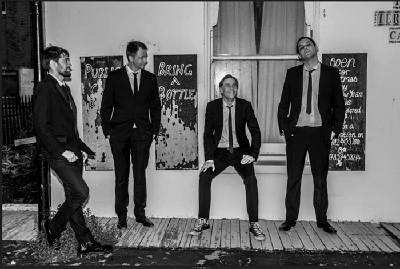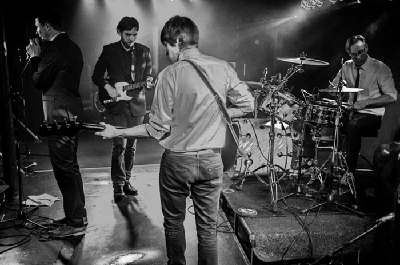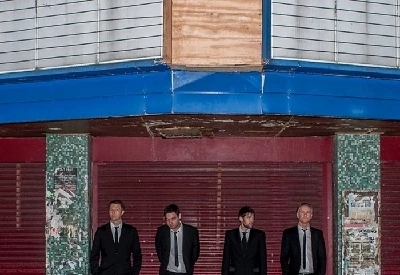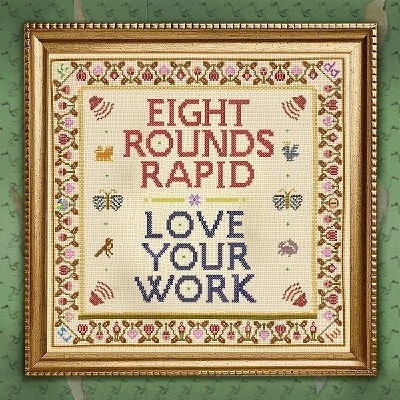published: 29 /
10 /
2020
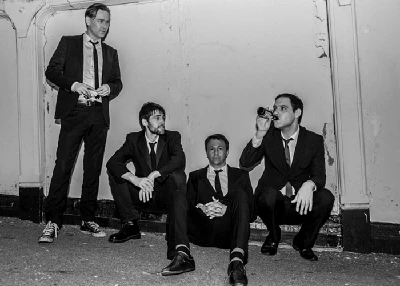
Kimberly Bright talks to three Eight Rounds Rapid members about their backgrounds, art, Southend, and not sounding like anyone else on the planet.
Article
Three-quarters of Southend’s punk-post-punk-R&B band Eight Rounds Rapid - singer David Alexander, bass player Jules Cooper, and drummer Lee Watkins - spoke to Pennyblackmusic recently following the release of their excellent new album 'Love Your Work'. Many Eight Rounds Rapid songs are from the point of view of a rough archetypal street character or tell such a person's story, drawing heavily from the band's surroundings. Despite being together for a decade Eight Rounds Rapid continue to be an enigmatic lot. Their idiosyncratic but unpretentious sound lures people into comparing it to other similar artists', most of whom the band hadn't even heard of. Not much had previously been discussed about their backgrounds, and we tried to rectify that. (We're still left with the unanswered question "When is a band not a band?")
Pennyblackmusic: Dave, were you ever tempted to become like one of the underworld characters you write about and not go to college?
Dave Alexander: I’m literally part-underground character who should not be allowed into any educational establishment. Fact!
PB: Were you influenced by the art museums and galleries in Southend growing up?
DA: We have many high class Art-eries. They seem a little out of place around here. In the '90s there was a Constable daub of Hadleigh Castle at the Beecroft, depicting the tower where I saw a ghost. I think the best art is experienced in the less likely places however. Bad music is bad art but more entertaining.
PB: Do you consider yourself to be mostly self-educated?
DA: Education is designed to bore you into finding other solutions. We have to try and do something, otherwise you do nothing, fact! I don’t like it when I’m told what to like, but now I don’t care what they think. I’ve taught myself that.
PB: What writers do you like? Do you actually like Dostoyevsky [referring to their song 'Dostoyevsky']?
DA: I read many books once. Then I began criticising said books and now I struggle with them. 'Crime and Punishment' covers a lot of ground. Translations are tricky, though, cause you are not really reading his words, and that ruins it. Dostoyevsky is dead.
PB: At what art school did everyone meet?
DA: I ended up at St. Martins, but the origins of the band came from Southend Technical College, the literal hotbed of all the good that ever came out of here. If you were not in some way connected to it through friends or wot not I cannot officially be your friend.
PB: Do you consider music to be just one of many artistic media that you use?
DA: Everybody’s clever nowadays. Taking photos. Drawing stuff that no one wants to see. I personally think Art is very rare. Actually less than 2% of the world’s volume of ‘Art’ is actually ‘Art’. About 98% is not Art. I know that Eight Rounds Rapid fits somewhere within some aspect of that breakdown. That statement is in itself ‘Art’.
PB: You’ve described yourself as a reluctant frontman, but you seem comfortable in the role. Did you do any theatre performances or poetry readings prior to the band?
DA: No. I have had to grow into the role of spokesman for the band Eight Rounds Rapid. All bands develop a culture over time. It is clear early on what is going on, and what the motivation is. All bands, that is, except our band. If the audience understands that what they are in fact witnessing is not a band, then we have been successful.
PB: Which of your characters do you identify with the most?
DA: All of them. None of them. I am the Stalker, I am the bloke looking for Steve, I am the man wearing a onesie. Southend has a logic and a code that you never find in London. They are all local archetypes of sorts. I like the heft of them (art term). There is a controlled agitation in our characters. A frustration. A nervous energy. That comes from all the band members.
PB: Who did you have in mind when you wrote 'Aging Athlete'?
DA: It’s more a metaphor but I ran for Harrow Athletics club when I lived there. The blokes in their 40s and 50s who kept at it, following routines, were interesting. Little improvements, little changes. There is a beauty in their commitment. I think there is a parallel with people who stick to their guns, even when no one is looking.
PB: How has Southend changed since you were kids? Are your old neighbourhood’s deteriorating or is gentrification a problem? Are you bothered by stupid Essex stereotypes?
Lee Watkins: The town is crumbling, half the shops stand empty and lots of homeless people are trying to survive on the streets, much like of the rest of the country. The Essex stereotype has been commodified, packaged, and sold on with great success. People love shows like 'TOWIE' up and down the country. People love stereotypes. Everyone likes to feel superior. It’s what we’re all taught to aspire to while growing up. We’re told we all need to look down our noses at someone else, in order for us to feel satisfied with our lot and with the cards that we’ve been dealt. This is taught in the tabloids and the press and trash reality TV shows. If people can make money by perpetuating a stereotype that they’ve been labelled with, then good luck to them. But only the fool believes stereotypes to be truth.
PB: How challenging was it in the beginning to raise the money to get started as a working band (equipment, travel, studio expenses)?
LW: We all had day jobs, so money was not the challenge. Finding the time together was the challenge.
PB: Have there been gigs that turned violent where you had to keep playing as if nothing was happening? Has a mic stand ever had to be used as a weapon?
Jules Cooper: Oh, that’s easy: April 8th, 2013, at The Bird’s Nest in Deptford. That’s a top venue. You can pick up a copy of 'The Morning Star' and pet the dog that sits at the bar. Being a Monday, it was guaranteed to be dead and we reluctantly dragged ourselves along to play, seeing it as a rehearsal more than a gig.
Fortunately, Margaret Thatcher died that day and the pub was rammed with happy people chanting “the witch is dead.” The energy was furious and one of our amps was knocked over after someone jumped on it.
DA: No, as romantic a notion it would be to say that it has, this has never happened.
PB: What is John Hannon like to work with as a producer? What did you do differently on 'Love Your Work' from 'Lossleader' and 'Objet D’Art'?
DA: Great. He’s a lovely man with an exceptional ear and a lot of talent. In general, the working practices were the same for all the albums. Although John possibly had increasingly more creative input over the course of the three albums.
PB: You've made excellent videos with Tony Burke and Toby Longbottom on presumably a limited budget. How involved are you in planning them out and making suggestions? Was it Simon's decision in the video for 'Channel Swimmer' to deprive the world of the opportunity to see him in a Speedo?
JC: If people want to see Simon in a Speedos, I think we should give them what they want, personally. For our video 'Channel Swimmer', the rest of us spent a freezing November day on Chalkwell Beach wearing nothing but a black pair of budgie smugglers and a rubber hat. Simon, who’d refused to do it outright, was allowed to be the “coach” and wear many layers of clothes while the rest of us covered ourselves in goose fat and ran into the Thames Estuary. His willingness to say “no” is a strength that has often stopped us doing shit things. Though on this occasion it only saved him...
DA: Toby did a very early video. Tony Burke has been instrumental with many of our videos and we leave it to him to do what he wants to do. Simon was the only one to insist on keeping his strides on. It was very cold. Very cold.
PB: What artists/musicians/bands inspired you? What memorable gigs did you attend that inspired you?
JC: Apparently we sound like Wire, but only the 'Pink Flag' era. And we sound like Sleaford Mods, but on a really bad day. And we sound like Mark E Smith, but almost unlistenable. The list goes on, but I don’t think they were an inspiration, as we’d never heard of them until we were well into the second album. The Fall is an exception. We saw them a few years before Mark died, and it was great. For one song, Mark was leaning so far out over the crowd that he would have tumbled off stage if his wife hadn’t been holding the tail of his jacket (while playing the keyboard herself). Chaotic and raw. We have a lot of time for that. Though our own chaos is probably just disorganisation.
LW: Seeing Wilko play with John Otway and the Hamsters at Club Riga, which was a small venue in Southend, in 2005, was a lot of fun. Watching a very drunken David Alexander openly mock the Hamsters guitarist to his face while at the bar mid-gig (he was using a wireless guitar radio link to his amp at the time), while obliviously inciting much ire from many surrounding Hamsters fans, was memorable.
PB: What other legendary musicians from Southend were you aware of growing up? Do people still tell stories about Vivian Stanshall or the Kursaal Flyers?
LW: Being best friends with Simon’s older brother while growing up I was very aware of Wilko, but not being into pub rock, that was about it for local musicians until the last ten years or so. I’m sure people still tell tales about said acts, but not among the people I know.
PB: Was the local R&B heritage something that you consciously thought about when you were writing your first songs together? Did it have anything to do with choosing your look as a band (mod-meets-Blues Brothers/throwback Motown R&B artists/'60s gangster black suits as a stage uniform)?
JC: When I joined, the others had been through a few bass players already — the songwriting had started and the suits were fixed. One the first album I think the only songs I was involved with from conception were Steve, 'Channel Swimmer' and 'Dostoyevsky'. Simon knows his R&B, but I don’t think the rest of us know a great deal about it. We never talk about R&B heritage, or about other people’s music in general for that matter. When writing music and coming up with an image, a lot of musicians will try to target a particular genre and, ideally, subvert it a little. They’ll write a song taking much “inspiration” from other artists. That’s clever. Too clever for us. We’re 100% the reverse, which means that, simple though we may be, we only truly sound like ourselves — but it also means nobody can work out what the fuck we are or how to market us. Our new German record label, Tapete, will be the exception, we hope.
LW: No. The look was an effort to appear uniform and nondescript, and to avoid being judged or identified by fashion trends or individual personal style (or lack thereof). We had no collective predetermined intention of incorporating any R&B influence when we started out, but Simon’s musical style is quite R&B influenced, and so that naturally comes through to some degree when we write songs.
PB: Thank you.
Band Links:-
https://www.eightroundsrapid.com/
https://www.facebook.com/EightRoundsRa
https://twitter.com/8RoundsRapid
Play in YouTube:-
Have a Listen:-
Picture Gallery:-
